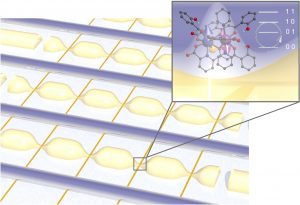SUMO
Scaling Up quantum computation with MOlecular spins
SUMO aims to set the basis of a new architecture for quantum computation and simulation, in which information is encoded in molecular spin qubits that are read-out and communicate by coupling to a superconducting resonator. This technology has a high potential for robust scalability, based on the microscopic and reproducible nature of the molecules and on the possibilities they offer for embodying multiple qubits, which provide an extra dimension to increase computational resources and to implement noise-resilient logical qubits.
The proposal focuses on two specific targets, which are crucial milestones for the realization of such magnetic quantum processor. The first is the implementation of active quantum error correction in magnetic molecules. The second is the attainment of strong coupling between individual molecular spins and single microwave photons. It involves cooperation between diverse disciplines and between experimental and theoretical methods and benefits from the European leadership in molecular magnetism. Coordination and supramolecular chemistry will be combined to design and synthesize molecules hosting multiple (3 to 9) spin qubits. Spin relaxation T1 and coherence T2 times of these qubits will be measured by state-of-the-art electron paramagnetic spectroscopy and optimized by chemical methods to values exceeding 100 ms. The same techniques will be applied to perform quantum gate operations required to implement error correction codes. Novel microwave superconducting resonators, able to squeeze microwave magnetic fields into nanoscopic regions, will be developed. Molecules will be nanopatterned into these devices by a combination of diverse molecular nanolithography and molecular recognition methods. Low-temperature spin relaxation and coherence of individual molecules will be explored via a novel combination of scanning tunneling microscopy and all-electronic pump-probe spectroscopy. The final goal is to perform circuit QED experiments on individual molecular spins to realize the strong coupling regime, implement basic quantum gate operations and read-out their quantum spin states.

CONSORTIUM
- Coordinator: Fernando Luis (CSIC/Instituto de Ciencia de Materiales de Aragón, ES)
- Sebastian Loth (Universität Stuttgart, DE)
- Johannes Majer (Wolfgang Pauli Institut/ Atominstitut, TU Wien, AT)
- Stefano Carretta (Consorzio Interuniversitario Nazionale per la Scienza e Tecnologia dei Materiali, IT)
- Richard Winpenny (University of Manchester, UK)
- Ardavan Arzhang (University of Oxford, UK)
PROJECT POSTER: Poster_SUMO_2018_Bucharest
MID-TERM REPORTING: Presentation of the mid-term results of the project
FINAL REPORTING: Presentation of the final results of the project
PROJECT WEBSITE: http://sumo.unizar.es/







